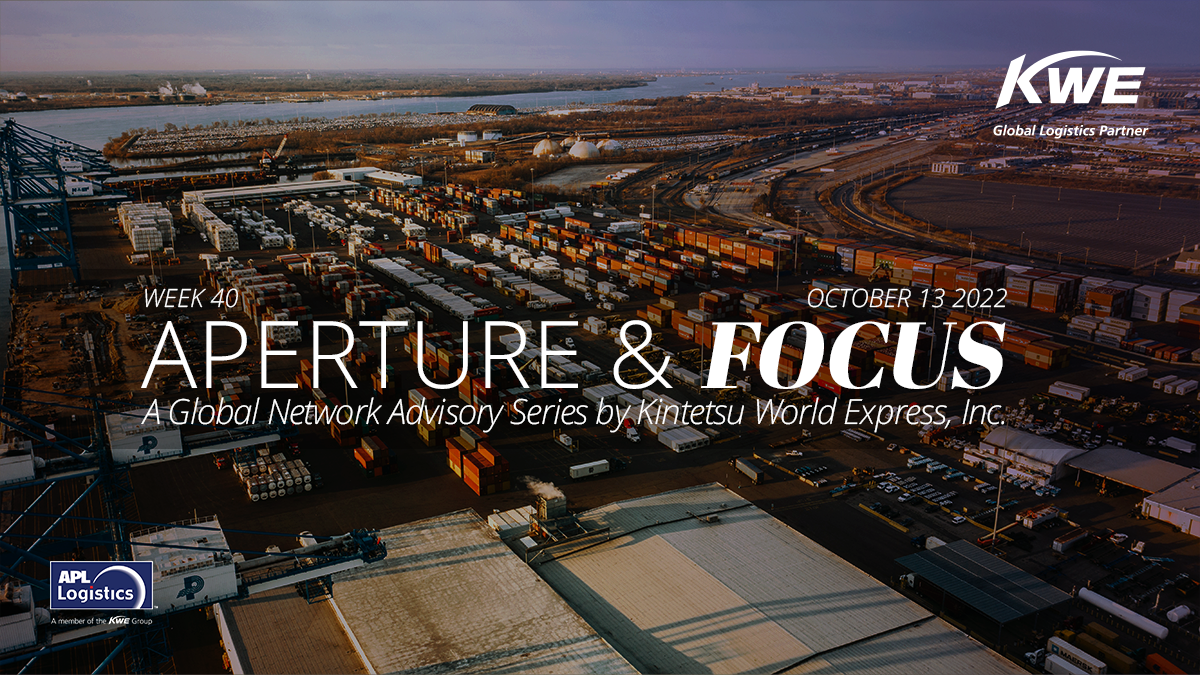Quote
Aperture & Focus 2022: Week 40

Global Aperture
The International Monetary Fund (IMF) lowered its global economic outlook amid high inflation and downside risks on multiple fronts, including reshoring efforts that risk “undermining efficiency”—a sentiment echoed by trade analysts who have observed the supply chain landscapes in Southeast Asia and the Americas since 2008.
Ahead of the 2022 UN-led Climate Change Conference (COP27), Chinese officials have proposed a new clean energy partnership framework to support investment and integration efforts, seeking audience with leaders of economic blocs like ASEAN (Association of Southeast Asian Nations), SCO (Shanghai Cooperation Organization), African Union, Arab League, and BRICS. The US and EU have also scheduled to discuss a similar investment framework to “counterbalance” China-lead infrastructure development.
Regional Focus
Americas
US trade officials approved new export controls for semiconductors and integrated circuits on October 7—days after the Department of Defense updated its Section 889 Banned Entities list to include Chinese military companies. Union representatives of Brotherhood of Maintenance of Way Employees Division (BMWED) reject the labor contract initially negotiated on September 11, reigniting concerns of a potential work stoppage after November 14. Separately, a proposed rule to roll back contract worker classifications could raise upkeep costs for trucking companies. The Mississippi River reopened on October 10 for barge service after a six-day closure to dredge two sections most affected by ongoing drought. As winter draws closer, heartland exporters must choose between shipping via barge or land-based transport methods like truck and rail as northern sections of the waterway begin to freeze over.
Tropical Storm Karl is forecast to make landfall in Mexico’s eastern coastal region on October 14. Originally expected to hit the port city of Veracruz as a Category 1 hurricane, the latest forecasts suggest that it will be downgraded to a tropical storm.
Following complaints of long border entry queues in California by Tijuana and Baja California officials, Texas stakeholders are pre-emptively feeling out plans to further develop the Marcelino Serna port of entry based in Tornillo—a mere stone’s throw southeast of El Paso. The corridor is a mainstay for shippers based in Northern Mexico.
In Canada, the ongoing tugboat strike at Vancouver Port sees almost 1,000 additional employees refusing to cross the picket line in solidarity—disrupting not only shipbuilding and dry docking, but cargo operations as well.
Asia Pacific
When it rains, it pours.
Severe flooding in Pakistan has stranded containers and saddled shippers with demurrage fees while Sri Lanka’s foreign exchange crisis stalls a crude oil tanker from unloading at Colombo Port, exacerbating the country’s fuel shortage. Indian exports track slower in the quarter leading up to the October 1 rollback of a GST (Goods & Services Tax) exemption that has been in force since 2018.
Vessel operators reinforce intra-Asia and Asia-Europe connectivity with respect to Middle East hubs, while airlines move to capture winter travel demand throughout the region based on brighter year-end outlook; the addition of international passenger routes and flight frequencies will serve countries like Korea, Taiwan, Japan, and Thailand.
Europe, Middle East & Africa
A vessel backlog has accumulated along the Black Sea due to a lack of cargo inspectors at origin and destination ports—in recent weeks, shipment clearance has been delayed by as many 15 days, prompting a UN call for Russia to conduct faster inspections for outgoing vessels.
The second scheduled strike at the Port of Liverpool began on October 11, stoking concerns of further congestion after the container backlog in the wake of the Felixstowe strike reached nearly 100,000 units. In South Africa, union-backed workers began an indefinite strike following failed labor negotiations with State-owned rail and freight operator Transnet. The strike continues to disrupt port operations nationwide, prompting carriers to suspend bookings to South Africa and shippers to turn to air freight, placing further strain on the air cargo market mid-recovery.